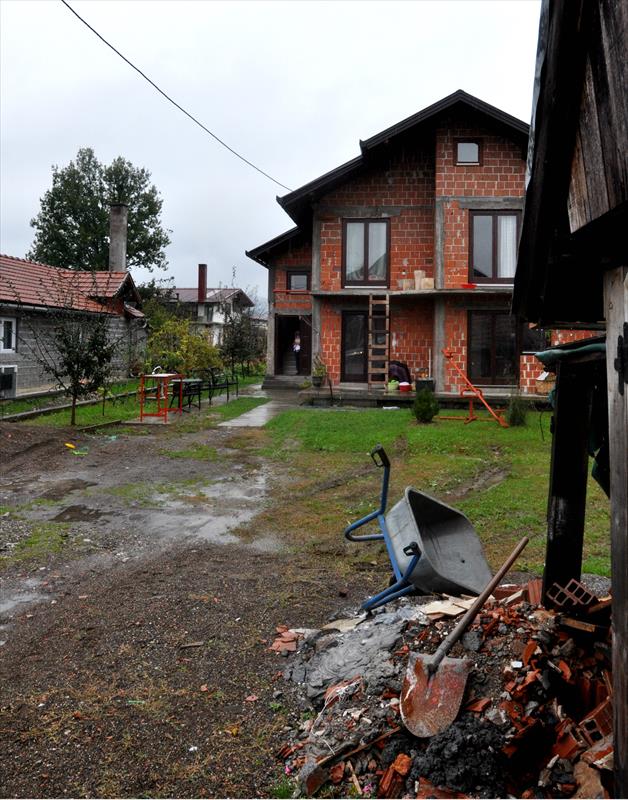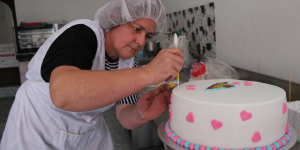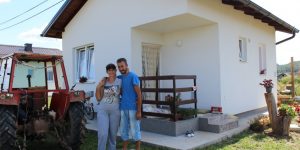Media correspondents from BiH had the opportunity to learn first-hand how the EU-financed housing rehabilitation efforts are progressing and were able to meet the direct beneficiaries of the EU Floods Recovery Programme through a press visit to Maglaj and Doboj on 22 October, 2014. The visit was organised by the Delegation of the EU to BiH.
Massimo Mina, Head of Operations for Social Development, Civil Society and Cross-Border Cooperation of the EU Delegation to BiH, emphasised that both Maglaj and Doboj were placed high on the list of recipients for EU assistance as these two municipalities were most severely affected by the floods in May 2014.
“With the aim to help the citizens of Maglaj and Doboj to normalise their living conditions, EU funds have been and will continue to be deployed to restore public services, rehabilitate housing units, and assist the communities in recovering their livelihoods. The total projected EU investment in Maglaj comprises more than 3 million EUR, and 4 million EUR in Doboj,” said Mina.
The priority of the housing rehabilitation component of the EU Programme is to assist the most vulnerable people affected by the floods. The overall objective of the Programme’s housing component is to rehabilitate 4,000 housing units across the flooded areas in BiH and thus directly enable 14,000 people to return home.
“We pay special attention to the selection of beneficiaries. It is important to underline that the EU funds cannot finance the overall housing rehabilitation process in BiH, rather these funds are directed exclusively to helping those who are in the most vulnerable situation. Our current estimate is that around 10 percent of the most vulnerable people in need of housing rehabilitation assistance will receive support through the EU Programme,” said Edis Arifagić, Programme Manager from the UNDP, which is the implementing partner of the EU Floods Recovery Programme.
The family of Meho and Nevzeta Zahirović is one of the seven families in Maglaj who already got their home back thanks to the EU assistance. “This is the happiest moment of my life,” said Nezveta, while holding the hand of her husband Meho, who is deaf. In the May floods, their apartment suffered total devastation and Meho and Nevzeta had little hope that they could ever return home. “When we realised that through the works financed by the EU absolutely everything was repaired, we could not believe it – look at it! Everything is brand new,” added Nevzeta.
There will be more similar positive news coming out of Maglaj in the near future as the works progress – in addition to the seven housing units already completed, the works on five more units are in the final stages. “Furthermore, the EU is investing one million EUR for rehabilitation of additional 277 homes in Maglaj, which brings the total number of housing units to be rehabilitated in Maglaj to 309,” explained Mina.
The visit to Doboj offered a chance for journalists to meet the youngest beneficiary of the EU floods recovery assistance. A baby girl named Lara Lukić, who was born on May 17, i.e. two days after the floods overwhelmed Doboj, did not seem to mind the cameras and the flashes. “We are happy for having been selected to receive EU housing rehabilitation assistance. It took only one month for the works to be conducted, and we can now move in and continue with our lives,” said Lara’s mother Mira Lukić.
The Lukić family is among 14 families whose homes have already been rehabilitated with EU financing, and the works on additional 51 homes are underway. The next phase of housing assistance is targeting 218 homes, bringing the total number of housing units to be rehabilitated with EU assistance in Doboj to 283.
“After today’s visit, I am pleased to say that our assistance has reached those who need it the most,” said Mina, while cautioning that in addition to repairing the damages, increased efforts are required to strengthen prevention and resilience in flood-prone areas across BiH. “This is a key challenge for the BiH authorities in the coming months and we are doing our utmost to be an active partner in these efforts. In the end preventing future floods and building resilience is a collective effort, in which everyone must play their part,” concluded Mina.
The EU Floods Recovery Programme was launched to restore normal living conditions in local communities and ensure that the aid reaches the most vulnerable ones in the aftermath of floods in May 2014. Funds will be used to restore public services and infrastructure, reconstruct housing units for the most vulnerable ones, and for social and economic recovery of local communities. The value of the overall programme is 43.52 million, of which 42.24 million is provided by the European Union.
The programme is implemented by the United Nations Development Programme (UNDP), the United Nations Children’s Fund (UNICEF) and the International Organisation for Migration (IOM).
For more information, visit the EU Floods Recovery Programme feature page




